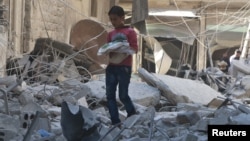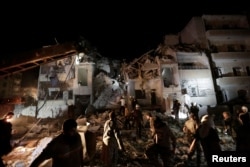A multinational effort to plan airdrops of food and medicine to thousands of Syrians in besieged communities begins in earnest on Wednesday.
Preparations for airdrops start June 1, under a plan initially announced by U.S. Secretary of State John Kerry at the conclusion of an International Syria Support Group meeting in Vienna in May.
In a joint statement, the 21-nation support group vowed to call on the U.N.’s World Food Program to carry out a program for air deliveries to 13 designated areas, if the Syrian regime or other forces on the ground continue to block land deliveries.
“Our experts in the region are drawing up a concrete plan of action,” said Farhan Haq, a spokesman for U.N. Secretary-General Ban Ki-moon. But “operating conditions are challenging,” he added Tuesday.
“Airdrops are always a last resort,” said Haq, who noted challenges in carrying out such operations in Syria. He said many of the designated communities are in urban areas with no suitable land for an airdrop. He also said high-altitude drops are not possible in some areas because of the risk of harming civilians on the ground.
Additionally, he said the World Food Program would need “reliable security coordination” to move forward.
Assad Regime Blocks Aid
State Department spokesman John Kirby said Syrian President Bashar al-Assad’s government has continued to “throw up road blocks” when it comes to humanitarian aid delivery.
“With literally the stroke of a pen, the Assad regime could fix this situation and let these people eat and let them drink water and later them get access to medicine,” said Kirby, who added that he did not know specifically when airdrops would begin.
Sporadic fighting has continued between Syrian-backed forces and rebels, in spite of a February cessation of hostilities.
“The continued use of siege and starvation as a weapon of war is reprehensible,” said U.N. humanitarian chief Stephen O’Brien on Friday.
The U.N. estimates more than 13 million Syrians are in need of some form of humanitarian and protection assistance.
WATCH: Thousands of Syrian Civilians Search for Safer Location
In a Tuesday statement, Syria’s main opposition group pointed a finger of blame at world powers for the country’s dire situation on the ground.
“Our people are dying, our cities are burning to the ground and yet the world stands idly by,” said High Negotiations Committee spokesman Salem al-Meslet.
He said the Assad regime’s cease-fire violations and continued blocking of humanitarian aid show “blatant disregard” for “internationally agreed upon resolutions,” a situation that he said contributed to last week’s resignation of Mohammed Alloush as the group’s lead negotiator for Syria political talks.
However, overall humanitarian conditions for Syrians are unlikely to change unless world powers exercise more military leverage in Syria, said Middle East Institute analyst Michael Eisenstadt. He said the Assad regime's use of “food as a weapon” has been a central feature of the country’s civil war.
“Airlift operations may provide temporary relief,” said Eisenstadt in a May article.
But he added, “urgently enhancing the military capabilities of moderate opposition groups is ultimately the only way to effectively counter the Assad regime’s use of food as a weapon.”







